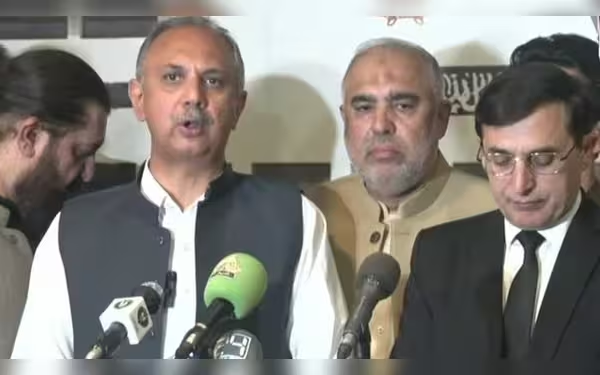Friday, November 8, 2024 01:13 AM
PTI Denounces Government Bills, Claims Attack on Democracy
- PTI rejects bills, claims government silencing opposition.
- Omer Ayub Khan criticizes parliament as a 'rubber-stamp'.
- Concerns raised over erosion of democratic values.
 Image Credits: tribune.com.pk
Image Credits: tribune.com.pkPTI rejects newly-approved bills, accusing the government of undermining democracy and silencing opposition voices.
In a significant political development, the Pakistan Tehreek-e-Insaf (PTI) party has officially rejected a series of newly-approved bills, claiming that the government is attempting to silence the opposition. This assertion was made during a press conference held by PTI leaders Omer Ayub Khan and Barrister Gohar Ali Khan outside the Parliament House in Islamabad on November 4, 2024. The leaders expressed their concerns regarding the diminishing role of parliamentary debate in the country, emphasizing that the current state of affairs is detrimental to democracy.
During the press conference, Omer Ayub Khan stated, "Pakistan’s parliament is being made a rubber-stamp," highlighting the party's belief that the legislative body is no longer functioning as an independent entity. The PTI leaders argued that the government's actions are undermining the very foundation of democratic discourse, which is essential for a healthy political environment. They called upon the public to recognize the implications of such actions and to stand against what they perceive as an erosion of democratic values.
The newly-approved bills, which the PTI has rejected, are seen as controversial and have sparked widespread debate among political analysts and the general public. Critics of the government argue that these bills could lead to increased centralization of power, further marginalizing opposition voices. The PTI's stance reflects a broader concern among various political factions regarding the government's approach to governance and its impact on civil liberties.
As the political landscape in Pakistan continues to evolve, the PTI's rejection of these bills may serve as a rallying point for opposition parties. It raises important questions about the future of parliamentary democracy in the country. Will the government heed the concerns raised by the opposition, or will it continue down a path that many fear could lead to authoritarianism?
The ongoing political discourse surrounding the newly-approved bills is not just a matter of legislative procedure; it is a reflection of the health of democracy in Pakistan. As citizens, it is crucial to remain informed and engaged in these discussions, as the decisions made today will shape the political landscape for generations to come. The call for a robust parliamentary debate is not merely a political strategy; it is a fundamental requirement for a thriving democracy.













